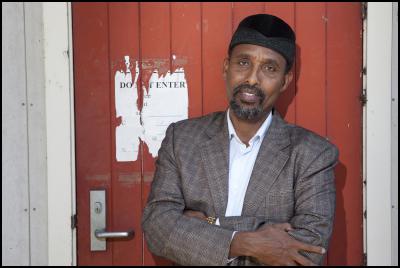Somali Refugees Struggling To Integrate in NZ
Somali Refugees Struggling To Integrate in NZ
Because Of Civil War Trauma, UC Researcher
Says
March 22,
2013
Many Somali refugees who suffered major trauma during their country’s civil war and subsequent refugee flight have struggled to integrate into New Zealand society, a University of Canterbury (UC) researcher has found.
UC PhD education student Hassan Ibrahim says those refugees with the greatest apparent level of recognised need and vulnerability were those with the poorest communication skill.
``This has resulted in their having a poor relationship with schools and has left them quite alienated. For many families the only time they dealt with their local school was when summoned to discuss the infractions of their children and any subsequent disciplinary measures. One of the greatest needs to improve communication and collaboration was identified as the ability to learn the English language.
``Other barriers included issues associated with racism, cultural awareness, teacher workload, lack of acknowledgement of refugees’ special needs in school policies, teachers’ low expectations of refugee parents, intimidating school environments, ambiguous information, the Somali oral culture, parents’ financial hardship, parents’ lack of transport, parents’ workload, inadequate housing and the families’ high mobility.
``There are no national policies or adequate resources to facilitate refugees improving their English language skills, nor to support schools in other aspects of their communication and collaboration with refugee families.
``The absence of guidelines and resourcing is another key factor behind the poor engagement between families and schools. Schools and their teachers also need good professional development that takes account of the diverse needs of these families in order to help build and strengthen better working relationships with refugee families,’’ Ibrahim said.
He recommended principals meet and welcome parents when children enrol, provide follow-up meetings after enrolment and developing structures, policies and guidelines to promote parent-school collaboration.
Principals needed to provide adequate resources to educate school personnel and mainstream parents about the refugees’ culture and experiences and designate a co-ordinator with responsibility for creating an inclusive environment with positive ethnic relations.
He also called for greater inter-agency co-ordination and co-operation between the schools and health services, social services, Work and Income New Zealand, the Immigration Service and the police.
Somalia has undergone a prolonged period of civil war, lawlessness and turmoil, which has resulted in many people becoming displaced, a number which have migrated to New Zealand as refugees.
Ibrahim’s study of Somali refugee families and their children’s schools took into account families’ experiences in their home country, the flight process, refugee camp experiences and the migration and resettlement process in New Zealand.
His research – from ``Warzone to Godzone’’ – took into account socio-economic status, urban versus rural origins, English language levels, poverty, employable work skills and refugee trauma.
Ibrahim’s research was supervised by Dr David Small.

Photo: Hassan Ibrahim
ENDS


 Health New Zealand: Community And Collaboration Bring New Mental Health Facility Garden To Life
Health New Zealand: Community And Collaboration Bring New Mental Health Facility Garden To Life NZBS: Turn Up The Music, Roll Up Your Sleeve - New Zealand Blood Service Drop The Beats For Donation
NZBS: Turn Up The Music, Roll Up Your Sleeve - New Zealand Blood Service Drop The Beats For Donation School Library Association of NZ Aotearoa: Students Missing Out - New Research Exposes Alarming Disparities Across Aotearoa
School Library Association of NZ Aotearoa: Students Missing Out - New Research Exposes Alarming Disparities Across Aotearoa ANZCA: Health Reforms Raise Fears Of Two-Tier System And Workforce Shortages
ANZCA: Health Reforms Raise Fears Of Two-Tier System And Workforce Shortages Māpura Studios: A Matariki Exhibition At Historic Alberton House
Māpura Studios: A Matariki Exhibition At Historic Alberton House Doc Edge Festival: Finalists For The Doc Edge Awards 2025, an Oscar®-qualifying event
Doc Edge Festival: Finalists For The Doc Edge Awards 2025, an Oscar®-qualifying event